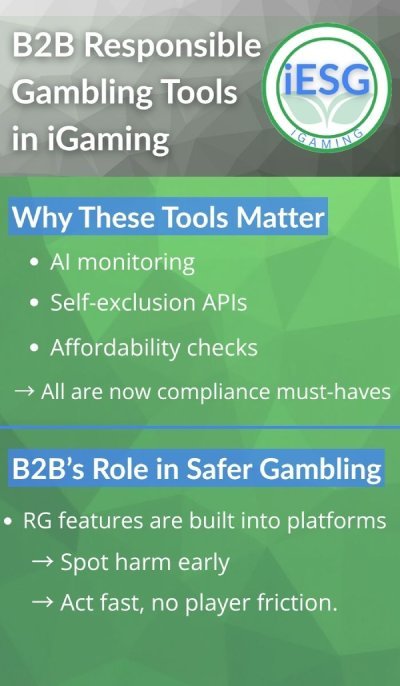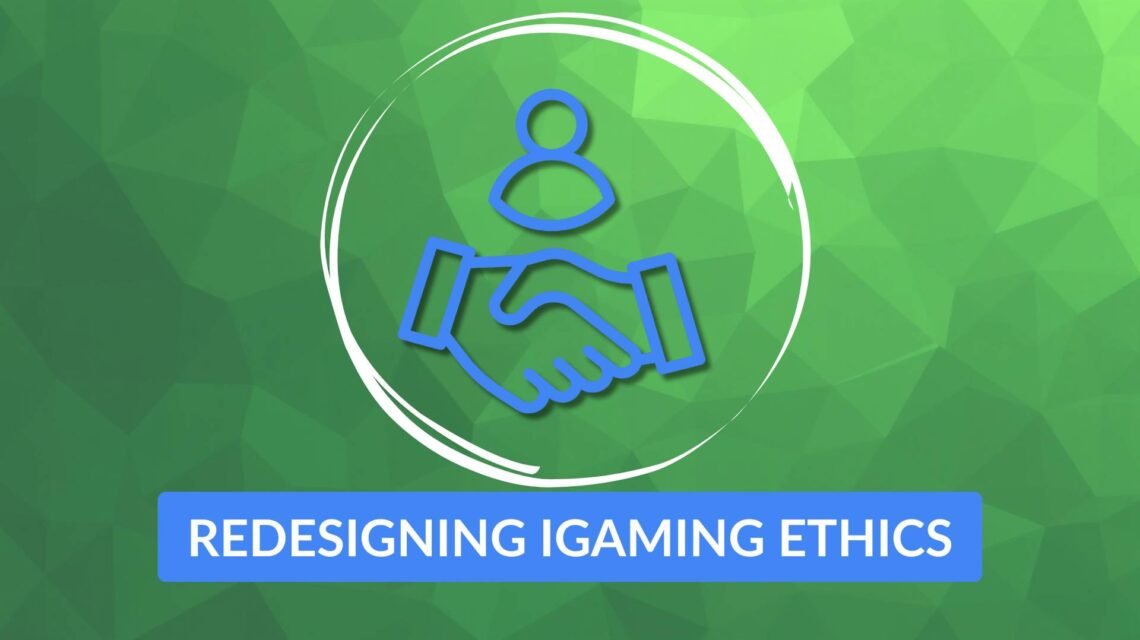When people think about safer gambling, they picture operators and regulators. But the real enablers often work behind the scenes. Who are they? Spotlight on: B2B responsible gambling tools: from AI detection systems to self-exclusion APIs are quietly reshaping the player protection landscape. And in 2026, the pressure is on!
Regulators are further tightening standards, players expect better safeguards, and ESG strategies are now a boardroom issue.
For the iGaming industry, the message is clear: safer gambling can no longer be an afterthought. Long-term success depends on embedding protection by design and B2B responsible gambling tools are central to making that possible.
What Are B2B Responsible Gambling Tools?

While B2B companies don’t run casinos, they do build the engines behind them. Platforms, payment systems, CRMs, and content, all flow through third-party providers. That’s where B2B responsible gambling tools come into play with features integrated into platforms that help prevent harm, support transparency, and ensure regulatory alignment. Now, what are the most common B2B responsible gambling tools?
- AI-powered behavior monitoring – flagging real-time risk indicators¹
- Affordability assessments triggered by behavioral and spend thresholds²
- Self-exclusion APIs that sync across multiple brands and jurisdictions³
- Session and spend limit pop-ups based on user engagement patterns
- Data-sharing infrastructure for industry-wide exclusion or harm reduction programs
In more and more jurisdictions, such as the UK and Denmark, these systems are no longer optional but mandatory. They are compliance requirements, not add-ons⁴. And as expectations rise, so does the pressure on B2B firms to embed them as default and not optional or nice-to-have features.
Tackling Harm Proactively: How B2B Providers Shape Safer Gambling
Plot twist: the most effective responsible gambling strategies start even before a player ever places a bet. Machine learning models can detect patterns and shifts in player behavior, such as unusual late-night logins, aggressive loss-chasing tactics, or erratic deposits. The good news is – this is escalated well before it becomes a big problem.
Let’s take a look at Sweden. The national operator Svenska Spel employs real-time behavioral analytics to detect early signs of harm. These measures are of a good faith and preventive nature, not party poopers. Players flagged by the system are contacted via email or call, encouraging them to self-assess and set limits⁵.
Meanwhile, Spillemyndigheden (the Danish Gambling Authority) has introduced mandatory risk categorization for players. B2B platforms are expected to support these efforts through early detection tools and seamless limit-setting modules⁶.
The key principle? Intervene early and with minimal friction. B2B providers with robust RG features, and especially AI-powered ones allow operators to act fast and appropriate without interrupting gameplay or violating privacy. And that’s not just good compliance, it’s good ethics.
Why Compliance Isn’t Enough: Tools vs. Black Markets
There’s one place where B2B responsible gambling tools are almost never “invited” to the party: the black market. Offshore and unlicensed operators have no mandate to protect players. A self-exclusion form buried in the depths of the footer doesn’t really count. The irony is that this makes black market casinos a moth to a flame for high-risk gamblers.
And here we are in a catch-22. Players start to migrate from regulated, some might say “over-regulated” markets to unregulated platforms, nullifying harm reduction efforts.
This is where B2B companies can become enforcers:
- Refusing to integrate with non-compliant or unlicensed operators
- Flagging suspicious activity or volume tied to unlicensed regions
- Blocking access to core services, like games, payments, or CRM infrastructure
- Participating in data-sharing alliances for excluded players (e.g., Pan-European self-exclusion networks)
In fact, regulators like the UK Gambling Commission, Spillemyndigheden, and Lotteriinspektionen (Sweden) now evaluate supplier relationships during audits and license reviews⁷. Working with grey markets isn’t just reputationally risky – it may soon be grounds for losing certification.
For B2B providers, being somewhat compliant doesn’t cut it anymore. Ethical gatekeeping is the next frontier of ESG alignment.
💡 ESG risk doesn’t start with one mistake. It builds through patterns: poor governance, fragile player safeguards, and dark UX practices. The iESG Assessment is designed to detect those patterns early.
Aligning with ESG: Standardization and Sustainable Design
While operators face fragmented regulations across markets, B2B providers have a unique opportunity: to define global standards for B2B responsible gambling tools. It’s a bold call but let’s think about how such a standardization could benefit all stakeholders:
- Operators can trust that compliance is built in by design
- Players get consistent protection regardless of platform or region
- Regulators can streamline audits with interoperable frameworks
- Investors can assess ESG maturity using transparent RG metrics
Companies like Monzo Bank have shown how standardization across APIs and services can scale social impact. A similar approach—say, an open RG compliance toolkit for B2B providers—could transform how the industry approaches harm prevention.
This ties directly into environmental, social, and governance strategy: embedding ethics and accountability into the architecture of gambling itself. ESG isn’t about reporting, it’s about how you design the system and future-proof it.
🏅 The iESG Certificate provides a sector-specific benchmark for how social responsibility and responsible gambling frameworks are structured, evidenced, and communicated to regulators and investors.
Conclusion: Responsibility Starts with the Code
B2B responsible gambling tools are no longer niche infrastructure. They’re the backbone of ethical iGaming. As regulators sharpen their oversight and public scrutiny intensifies, the question isn’t whether suppliers should support safer gambling but how quickly they can bake it in by default.
Because in this new era, platforms won’t be judged only by how they respond to harm, but by whether their systems ever let it happen in the first place. If credible ESG and responsible gambling maturity matter to your business, book a free call.
FAQ – B2B Responsible Gambling Tools
What are B2B responsible gambling tools?
B2B responsible gambling tools are integrated platform features that help operators prevent player harm., ike AI alerts or self-exclusion APIs—
How do B2B companies shape safer gambling in iGaming?
By embedding harm detection, affordability checks, and exclusion protocols directly into gaming infrastructure.
Why are B2B responsible gambling tools essential in 2026?
Because regulators and ESG investors now expect prevention to be hardcoded, not retrofitted.
What regulators oversee B2B responsible gambling practices?
The UKGC, Spillemyndigheden (Denmark), and Lotteriinspektionen (Sweden) all assess supplier responsibilities.
How can B2B tools prevent black market gambling?
By refusing integrations with non-compliant operators and supporting shared exclusion frameworks, B2B responsible gambling tools help counter the black market.
Sources:
UK Gambling Commission: “Safer Gambling“
https://www.gamblingcommission.gov.uk/public-and-players/safer-gambling
UK Gambling Commission: “Working together to improve standards of safer gambling“
https://www.gamblingcommission.gov.uk/news/article/affordability-checks-ukgc-update-2023
Betblocker
https://betblocker.org
Spillemyndigheden: “Responsible gambling“
https://www.spillemyndigheden.dk/en/responsible-gambling
Danish Gambling Authority: “Risk Categorisation“
https://www.spillemyndigheden.dk/en/information/information-59
UK Gambling Commission: “B2B Partnerships“
https://www.gamblingcommission.gov.uk/licensees-and-businesses/guide/page/working-together-to-improve-standards-of-safer-gambling
PwC: “Gambling Outlook“
https://www.pwc.com/us/en/industries/tmt/media/outlook/gambling.html


Jason
Excellent point by Wolfgang on how RG tools are shifting from “nice-to-have” features to a core ESG requirement for B2B providers. I’m particularly interested in your take on the interoperability of these systems—how do we ensure that deep AI-driven monitoring doesn’t create too much friction, pushing players toward offshore sites? I was looking at the modular setup of EveryMatrix at https://igaming-solution.com/everymatrix/ and wondering if a modular approach like theirs makes it easier or harder for operators to maintain consistent compliance standards across different jurisdictions? Would love to hear your thoughts on whether such modularity helps in “baking responsibility into the code” or if it creates more gaps for the black market to exploit.